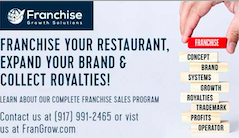Photo by Jason Goodman on Unsplash
Teamwork is a critical factor that can significantly influence a franchise brand’s growth trajectory. By cultivating a collaborative environment where franchisees and franchisors work together, businesses can unlock the potential for scalable and sustainable growth. The power of collective effort, communication, and shared knowledge drives innovation and helps brands adapt to an ever-changing market landscape.
Harnessing Teamwork for Franchise Brand Growth and Expansion
By FMM Contributor
Successful franchise growth depends on more than the concept’s strength or the franchisor’s financial stability. A key, often underestimated, factor is the power of teamwork. A collaborative approach, leveraging the collective expertise of franchisees and franchisors, can accelerate a brand’s expansion and build a robust and resilient franchise network.
The Role of Teamwork in Franchise Success
Teamwork within a franchise system extends beyond the daily operations of individual units. It involves a concerted effort between franchisees, franchisors, and the support staff. The synergy that emerges when these stakeholders align their goals and share resources fosters an environment conducive to rapid growth.
The franchisor-franchisee relationship is crucial in this context. According to a study published in the International Journal of Franchising Law, franchises with a strong, communicative relationship between franchisor and franchisee tend to outperform those that operate in silos. Franchisees often have boots-on-the-ground experience and provide invaluable feedback that can improve operational efficiencies, marketing strategies, and customer experience. On the other hand, franchisors offer training, support, and brand equity that help franchisees navigate challenges.
Leveraging Collective Expertise
One of the strengths of a franchise system is the ability to harness the collective knowledge of a diverse group of operators. Franchisees come from different backgrounds, industries, and regions, contributing varied perspectives on how to run the business effectively. Sharing best practices—whether it’s how to market in a specific region or how to optimize labor costs—can elevate the entire franchise system.
Regular franchisee forums, conferences, and open communication channels allow franchisees to network and exchange ideas. This creates a knowledge-sharing culture where everyone benefits from each other’s experiences. Brands like McDonald’s and Subway are known for their franchisee councils, which give franchise owners a formal platform to communicate with leadership.
Fostering Innovation and Adaptability
Innovation is essential to brand growth; the best ideas often come from franchisees closest to the customer. Brands can continually evolve by fostering a collaborative culture where franchisees feel comfortable sharing innovative ideas. For example, the popular McCafé line was first introduced by a McDonald’s franchisee in Australia, and it later became a global success.
Teamwork encourages brand-wide adaptability, which is critical for growth in diverse markets. A franchise system that promotes open communication and teamwork can quickly pivot and adapt to regional challenges, customer preferences, or economic shifts.
Strategies to Encourage Teamwork in a Franchise System
- Clear Communication Channels: Regular and transparent communication fosters trust and prevents misunderstandings. Online platforms and communication tools help bridge gaps between the corporate office and franchisees.
- Incentivizing Collaboration: Franchisors can offer rewards for franchisees who actively contribute to the brand’s development. These rewards come in the form of recognition, financial incentives, or even leadership opportunities within the brand.
- Training Programs: Franchisees and their employees need consistent training on teamwork and leadership. Franchisors can host team-building events, webinars, and workshops emphasizing collaboration’s importance.
- Franchisee Councils and Committees: Establishing councils gives franchisees a voice in decision-making, making them feel valued and heard.
Teamwork is a critical factor that can significantly influence a franchise brand’s growth trajectory. By cultivating a collaborative environment where franchisees and franchisors work together, businesses can unlock the potential for scalable and sustainable growth. The power of collective effort, communication, and shared knowledge drives innovation and helps brands adapt to an ever-changing market landscape.
In the franchise world, no one succeeds alone. Growth comes from a unified, team-oriented approach that brings out the best in everyone involved.
LEARN MORE ABOUT FRANCHISE GROWTH HERE
========================================
This post was researched, outlined and edited with the support of AI







